Until the early 1990s, public high school students often had a variety of skills-based programs they could enroll in alongside their normal studies, like metalwork, woodshop, home economics, or automotive repair.1
Things have changed over the past three decades. Although there are still very valuable vocations taught at the high school level, many schools have shifted their focus from skills training to college preparation. Students who want to learn technical skills must now attend one of the 9,400 postsecondary schools that offer vocational programs, like community colleges, skills centers, and technical schools.2
This emphasis on college left some students feeling that vocational training was somehow less valuable than a four-year degree. Unsurprisingly, the number of students pursuing technical training decreased.3 But the popularity of these programs is back on an upswing. With over half of students feeling that a four-year degree is no longer worth what it costs, enrollment in technical and trade schools increased from 9.6 million in 1999 to 16 million in 2014.4
The truth is that the value of technical education is in how close it gets you to your goals. And a vocational program can be the perfect vehicle to move you closer to the career you want.
The Pros of Attending a Vocational School
Finish Your Education Faster in Trade School
A skills-based program is usually shorter than a four-year degree. Diploma programs may take less than a year, while associate degree programs can generally be completed in one to two years. This means that students can start making money sooner than their college-bound counterparts.
Earlier earning potential is especially great news for older career changers who want to learn a new skill, but don’t have four years to dedicate to a bachelor’s degree!

Vocational Training Is Often Flexible
Many modern programs are flexible, offering education to students who may not have the option of studying in a traditional program. These students may work full-time, or they could be older students returning to school after having families.
Trade and vocational schools that offer classes on nights and weekends or online make training available to a large group of hardworking people who would otherwise be shut out of postsecondary education.
“I could not attend culinary school in person since the closest onsite school was a two-hour drive. I am proud of my ability to complete the [online] classes and assignments while working full-time, caring for loved ones, and participating in church events.”
Sharon Watts, Online Culinary Arts Graduate
Technical Programs Are Often Less Expensive Than a Four-Year Degree
Traditional college costs an average of three times as much as trade school.5 So trade and technical school students may be able to complete their programs with less student loan debt.
Between less debt to repay and entering the workforce sooner, trade school graduates can find themselves in a better financial position five or ten years out of school than those who get four-year degrees. This isn’t always a deciding factor for some, but student loan debt should certainly be considered before making any decisions about pursuing further education.
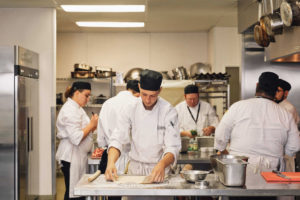
Vocational Programs May Have Lower GPA Requirements
There are many bright students who simply don’t excel in courses that don’t interest them. With a GPA deflated by grades in these low-interest classes, it can be difficult to get accepted to colleges that are hyper-focused on GPAs and standardized tests.
Vocational programs often have lower GPA requirements than traditional colleges. They know that a student’s grade in World History has nothing to do with their potential to be great computer technicians or diesel mechanics, or pastry chef. So these schools can be a fantastic pathway for those who didn’t do as well academically in classes outside of their interests.
The Essential Culinary Career Survey The Essential Culinary Career Survey What's your ideal culinary career: Fine dining? Your own restaurant? Pastry? Get our self-evaluation survey to find out! We’ve compiled a checklist of all of the essential questions into one handy guide: career options, culinary interest surveys, educational opportunities, and more.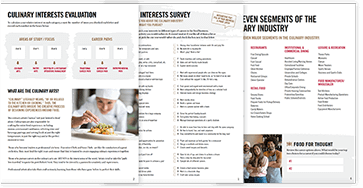
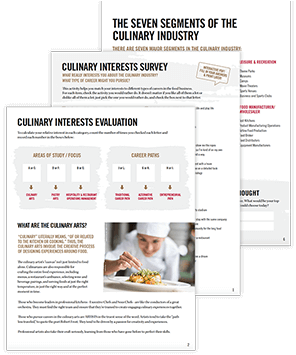

What Is The Difference Between a Trade School, Technical School, and Vocational School?
While these terms are often used to categorize different types of continuing education, their definitions aren’t set in stone and are sometimes used interchangeably.
- A vocational school is a broad term for any type of educational institution that prepares students for a specific job immediately following graduation.
- A trade school is one type of vocational school that focuses on more specialized hands-on training in a certain industry or skill, like auto mechanics, cosmetology, or medical imaging.
- Other types of vocational schools might include tech schools where you can earn certifications in technical fields such as engineering, finance, or information technology.
Build a Network of Industry Contacts
In a vocational program, students and teachers are invested in the same industry. At culinary school, students connect with like-minded foodies who are about to embark on careers in food service and hospitality. And their Chef Instructors are experienced chefs and culinarians themselves. This network can help provide moral support, advice, and possible job opportunities in the future.
In college, on the other hand, students are pursuing dozens, possibly hundreds of different fields. Many don’t know what type of career or even industry they want to pursue. Building a network may be more of a challenge in this wider population.
“While each classmate brought their own strengths, we were encouraged to collaborate and push one another to achieve our daily goals. I knew I would have the support of an amazing network upon completion of the program.”
Suzanne Clancy, Boulder Culinary Arts Graduate and Kitchen Manager, Hillstone Restaurant
Students in Vocational School Graduate with Applicable Work Skills
Vocational school graduates will know many of the tools, terms, and techniques that they’ll need on the job. They still have more to learn when they graduate, but they’ll have a skills-based foundation with which to begin.
College tends to be more theoretical than practical. Students may graduate with little pragmatic knowledge, and must sometimes pursue further education before they can find decent jobs in their desired industry.
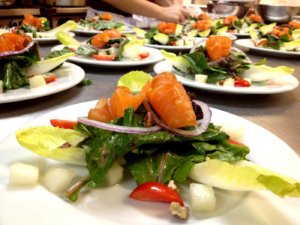
The Cons of Attending a Vocational School
Vocational School Is Narrower in Scope
In college, students have the opportunity to pursue a wider range of courses and topics, especially during their first two years. This can be helpful for those who don’t have a clear career path in mind.
But most vocational students already know their goals. So they don’t need the same exploratory courses.
Some Vocational Programs Don’t Offer Supplemental Skills
Some vocational schools don’t provide supplemental skills that will be useful in business, like effective communication or math and accounting. Fortunately, this can be addressed by being selective when choosing your program.
At Auguste Escoffier School of Culinary Arts, associate degree students can study Technical Writing for the Hospitality Industry and Foodservice Math & Accounting, among other industry specific, business-focused courses. These skills can make them better leaders and entrepreneurs.
“History, terminology, calculating COGS, profit margins, profit/loss, product waste—there’s so much more to learn than just cooking.”
Lance McWhorter, Escoffier Online Graduate; Executive Chef/Owner, Culture ETX; Food Network’s “Chopped” Contestant
Some Vocational Programs May Not Be Eligible for Federal Financial Aid
This will depend entirely on the school and the program. In general, schools must be accredited in order for students to qualify for federal financial aid. So if you need funding, make accreditation a prerequisite during your school search.
Escoffier’s Austin and Boulder schools — including the online programs through the Boulder campus — are both nationally accredited. So eligible students can pursue funding like Pell Grants and Direct Loans from the federal government.
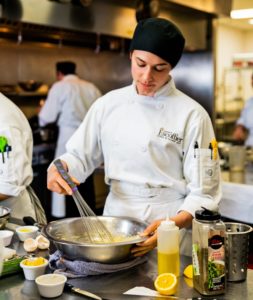
A Degree or Diploma Proves Your Dedication to Your Trade
You may be sold on a vocational career. But do you have to attend school at all in order to achieve your goals? After all, in the culinary world, there are chefs, bakers, and pastry chefs who didn’t go to culinary or pastry school.
While a culinary school education isn’t a prerequisite for a successful career, it can be a major point in your favor when it comes to hiring decisions and career advancement. Degrees and diplomas prove that you have a foundation of technical skills. Plus, that credential shows employers that cooking isn’t just a hobby or even a job for you. It’s a career. You’ve invested in your education and the ongoing development of your skills. And that makes you an attractive candidate to potential employers and mentors alike.
“Honestly, without [culinary education] I wouldn’t be nearly as successful. The knowledge I gained helped me rise quickly as a chef. I may have still started at the bottom rungs of the ladder but I certainly wouldn’t be working where I am now.”
Max Feist, Boulder Culinary Arts Graduate
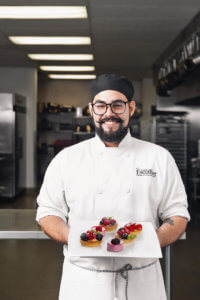
Who Benefits Most from Vocational School?
With all that in mind, is vocational education the right choice for you?
Ask yourself these questions.
Is Vocational School Right For Me?
- Do I want to start working in my chosen profession as soon as possible?
- Do I want to be in a practical, applied learning environment?
- Is cost an important factor in choosing my school?
- Do I want to graduate with less student loan debt?
- Do I need a flexible schedule to fit into my work or life obligations?
If you can answer “yes” to these questions, then you should seriously consider a trade-based education.
Vocational school can be a particularly good fit for those who are looking to change careers later in life. With an average age of 28, students pursuing occupational skills are often adults working on a second or even third career!6
Are You Ready?
Trade and vocational schools are one of the best options for those who know what they want and are ready to make it happen. As college costs continue to skyrocket, expect to see more and more high school graduates choosing to study a useful, career-building skill set!
If you’re ready for a practical education that will get you closer to achieving your dreams, contact us today to get started!
To read more about culinary education, try these articles next:
- How to Get Into Culinary School
- Job or School: Why Not Both?
- Culinary School Pros & Cons: Who It’s For, Who It’s Not, and How to Decide if It’s For You
1Student Research Foundation
2State University
3NCES
4The Atlantic
5Careers School Now
6NCES

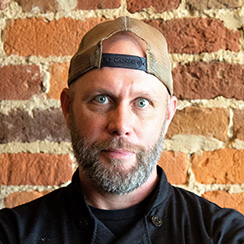 “History, terminology, calculating COGS, profit margins, profit/loss, product waste—there’s so much more to learn than just cooking.”
“History, terminology, calculating COGS, profit margins, profit/loss, product waste—there’s so much more to learn than just cooking.” “Honestly, without [culinary education] I wouldn’t be nearly as successful. The knowledge I gained helped me rise quickly as a chef. I may have still started at the bottom rungs of the ladder but I certainly wouldn’t be working where I am now.”
“Honestly, without [culinary education] I wouldn’t be nearly as successful. The knowledge I gained helped me rise quickly as a chef. I may have still started at the bottom rungs of the ladder but I certainly wouldn’t be working where I am now.”